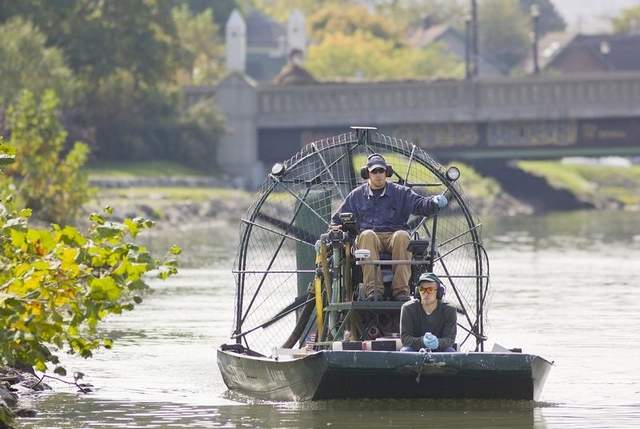Hydrilla treatment starts in Cayuga Inlet
More eradication work coming in spring in larger area
By Liz Lawyer,
Ithaca Journal
Ithaca, NY, October 11, 2011 - A little green plant called hydrilla has the power to temporarily close down boating in the Cayuga Inlet, which has warranted a declaration of a state of emergency in the City of Ithaca, and will cost nearly $100,000 in county, municipal and state funds this season.
Tuesday, crews from Allied Biological Inc., a lake management and wetland restoration consulting firm headquartered in New Jersey, applied the first round of the herbicide Aquathol K, which is expected to disrupt the hydrilla's reproductive process this fall and prevent it from spreading. A second round is planned Wednesday.
But the fight against the invasive plant will not end there, as the herbicide will only kill the leaves, stalks and turions, or buds. The plant's tubers will remain alive in the inlet's sediment.
Eradication efforts will have to wait until next spring, said aquatic biologist Bob Johnson. Not only that, Johnson said the task force members have no doubt fragments of the plant have been carried out to the lake itself, especially after the Labor Day-week rain. That means future efforts to beat back the spread of hydrilla will have to focus on a much wider area than the 95 acres currently permitted by the state Department of Environmental Conservation for herbicide application.
The invasive aquatic plant went from unheard-of in Ithaca to the top of
several agencies' to-do lists after a chance discovery of a hydrilla bed
in mid-August by a participant in a floating classroom. A subsequent
survey of the area revealed that there are beds up and down the inlet.
A task force quickly formed to handle the infestation, including the
City of Ithaca, Tompkins County, Cornell Cooperative Extension, the New
York Invasive Species Research Institute, the Cayuga Watershed Network,
and New York Sea Grant. The DEC is helping with the initial response.
 Stephen Wilson (top) and Shane VanAlstyne of Allied Biological disperse
the commercial herbicide Aquathol K
Stephen Wilson (top) and Shane VanAlstyne of Allied Biological disperse
the commercial herbicide Aquathol K
through lines in the bottom of a fan
boat Tuesday morning (October 11, 2011) between the Route 96 (background)
and Route 89
bridges in Ithaca. / Photo courtesy of Simon Wheeler, Ithaca Journal
Aquathol K, with its active ingredient endothall, is not toxic to animals or humans in the concentration it will be used in the inlet, according to an information sheet prepared by the Cayuga Inlet Hydrilla Task Force and available on Cornell Cooperative Extension's website. Johnson said the chemical begins to disburse and break down quickly after being applied beneath the water surface. In each application, the chemical will be diluted to 1.5 parts per million.
But as a precaution, use of the water in the inlet will be prohibited for drinking for two weeks, and for swimming and bathing for 24 hours.
The city is also asking that no one fish in the inlet, so as to avoid disturbing the hydrilla and risking facilitating its spread. However, there is no restriction on catching or eating fish from treated waters.